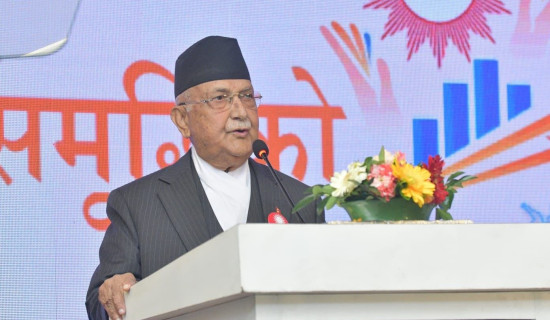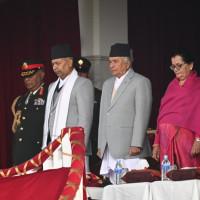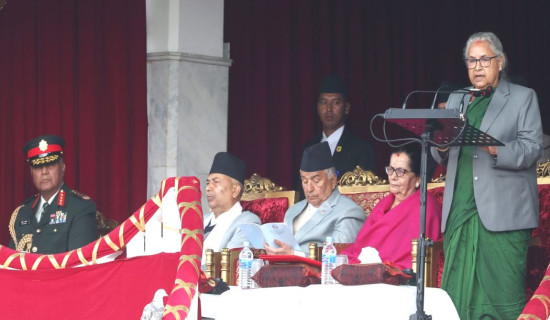- Thursday, 19 February 2026
Republic And Renaissance
When Nepal was declared a republic 15 years ago on 28 May 2008, the whole country was jubilant, except for the monarchy and its supporting elements. However, the triumphant mood has largely subsided now and an erroneous self-doubting trend has set in. Undoubtedly, those who took charge of the nation in the given period failed to deliver to the people's high aspirations. The pledge of economic revolution the leaders made following the declaration of the republic has not been materialised yet nor is there any serious effort to this goal. The number of people questioning the efficacy of the new political set up has increased.
A concern whether growing skepticism over the new polity will eventually lead to resurrection of monarchy, the political pivot of feudalism, has gripped the progressive segment of the society. The concern is not baseless. Leaders who risked their life for republic are found being ridiculed increasingly in social media which mirrors the mood of the people, particularly youths. If this mood develops into a mindset, the resultant situation will be terribly chaotic. Instead of taking pride in leaders that worked to bring about historical changes why are a large number of youths abhorrent of them? What is the reason for the repulsion? Is it due to a stretch of Nepali renaissance or the zeal to break from the past for a better future? These questions call for a serious attention of those who stand for republic.
One can equate republic with renaissance in Nepali context. If renaissance means break from the past, an awakening, a renewed interest in something, republic has been a renaissance from every angles. Renaissance in Europe heralded modern age, freeing the society from the Dark Age that was characterised by religious superstitions, feudalism, and different forms of discrimination. It led the society to believe in scientific reasoning. Some argue renaissance extended for a period of four centuries beginning from thirteenth century. In Nepali context, renaissance began with the Nepali Congress led armed revolution that overthrew the Rana autocracy and introduced democracy in 1951. Another historic milestone of the renaissance has been the establishment of the republic, a concrete result of the decade long people's war. In both 1951 and 2008 cases, Nepal broke away from the past polity and adopted a new, better one. However, the historic change of 1951 was snatched away within a decade when another autocratic Panchayat system was imposed by the monarchy.
Establishment of republic in Nepal in 2008 was so historically important political change as the American Revolution (Independence) in 1776 or the French Revolution in 1789. To some respects, declaration of republic was similar to the Russian revolution in 1917, the Chinese revolution in 1949 and the Indian independence in 1947. This comparison is made just to point at the level of euphoria and aspirations of the general public.
Although there have been unprecedented changes in socio-economic sectors of the country, the levels of change have fallen short of people's expectation. Some twenty years ago, it was unthinkable for a Dalit to be one of the local leaders in the high-caste dominated society. But it is a reality now because of the republican constitutional provision. Inclusive and participatory democratic provisions have ensured representation of the marginalised, minority communities in state organs as well as in public employment. A true unification of all communities into a nation-state did indeed begin with the establishment of republic. If we compare the period after the republic and before the republic, the period after the republic outsmarts the one before it in any respects such as education, health and infrastructure development. However, the economic growth has not taken off as expected. And this has disenchanted many. But this is not only the reason for the repulsion.
The role of the news media, the mudslinging among the major parties and the people's exposure to the outer world by means of the internet and the social media also contributed to the fermentation of the repulsion.
Turn by turn the major political parties that held the power castigated one another in such a way that the young generation found them all similar or equally useless. Instead of feeding the general public with positive outcomes of the new system by means of highlighting them, the news media also focused on negative aspects and wrong doings of the leaders in power as if the system was faulty. The leaders on their part lacked the vision to grasp and respond to a sudden psychological change in youths brought about by abrupt exposure to the developed world by means of the internet and the social media. The internet and social media made it easy for youths to peer into the advanced societies and compare their situation in the light of the information provided by the domestic news media. The leaders were solely blamed for the pathetic situation. The unprecedented success of the Rastriya Prajatanra Party, a pro-monarchy political party, and the sudden success of the newly formed Rastriya Swatantra Party in the parliamentary polls held in November last year signals the growing detachment of the people with the political parties that worked together for republic.
There could be a debate for a better republic. Discussions on natural endowment, geopolitical location and resultant external pressure and role of the leaders and parties with regard to backwardness of the country are positive steps.
But questioning the republic and secularism itself is equal to turning the clock back. Renewed interest of the youths in politics is a welcome development. This interest only shows extension of our type of renaissance period. Youths should know that any monarchy is a remnant of feudalism, a barrier to the ideal that everyone is equal by birth. Skepticism is a characteristic of awakening. Growing skepticism of the youths in established political parties can also derail the whole political process toward much anticipated prosperity. Therefore, the political parties, specially the republican forces, should work harder to prove that they are for good governance and transparency and fairness are part of their lifestyle. As the party that initiated the people's war and played a key role in founding the republic, the main ruling party, CPN (Maoist Center), has even a greater role at present to keep people's optimism in republic.
The way the present government has been able to crackdown on some of the corrupt leaders and bureaucrats in relation to the fake Bhutanese refugee has raised some hope, but this is almost nothing if we compare it with the mountain of tasks the government has to accomplish to ensure good governance, prompt service delivery and economic development as aspired by the youths intoxicated with renaissance thoughts, the thinking to make everything anew.
(Tiwari is coordinator of the online edition of this daily, risingnepaldaily.com)
















